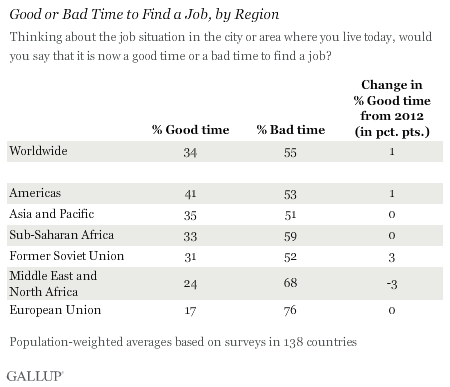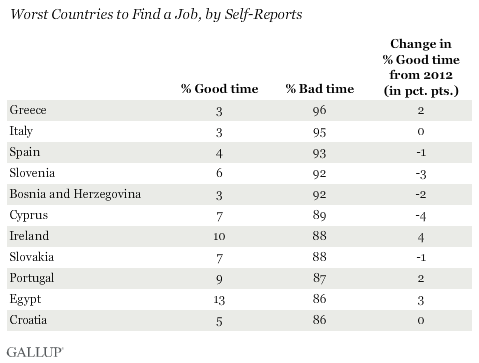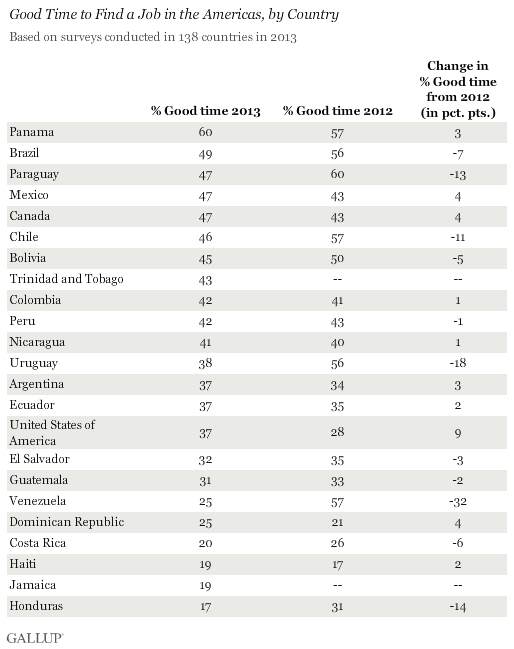This article is part of a weeklong series focusing on how people worldwide answer some of today's most pressing questions on employment and the economy.
WASHINGTON, D.C. -- The jobs outlook remained about as dismal worldwide in 2013 as it was in 2012, with more than half of adults (55%) saying it was a bad time to find a job in their communities and one in three (34%) saying it was a good time to find a job. Europeans continued to be the most pessimistic, with three in four residents (76%) in the European Union saying it was a bad time to be job hunting.

These data are from early 2013 and don't reflect some of the improvements that have occurred since. Europeans' pessimism largely reflects the uncertainty that was still gripping much of the region in mid-2013, when most of the surveys were conducted. Since then, the labor market has started to recover moderately in the EU, but there are large divergences in unemployment among member states. The quality of the jobs being created also remains a concern, as does long-term unemployment, which the European Commission reports is continuing to increase in some of the countries with already high unemployment rates.
Nearly Universal Pessimism About Job Market in Southern Europe
Nearly all of the 11 countries where more than 85% of adults said it was a bad time to find a job were in southern Europe. Nearly all Greeks (96%), Italians (95%), and Spaniards (93%) were dour about their job markets, reflecting the negative employment growth in their countries that has persisted even into the first quarter of 2014. In each of the three countries, less than 5% at the time of the 2013 survey thought it was a good time to find a job.

Former Yugoslavian states Slovenia (92%), Bosnia and Herzegovina (92%), and Croatia (86%) also ranked highest in job market pessimism. Ireland (88%), Slovakia (88%), and Egypt (86%) were the only non-southern European nations toward the top of the list.
Jobs Outlook Strongest in Americas
On the other side of the world, residents in the Americas were more optimistic about job prospects in 2013, with 41% saying it was a good time to find a job in their city or area. Still, more than half in the Americas (53%) said it was a bad time.

Latin America and the Caribbean buoyed much of the optimism in the Americas last year, with 43% overall saying it was a good time to find a job. However, this is down slightly from 47% in 2012. Job market views soured significantly in a number of countries in the region, including Venezuela, where the "good time" percentage dropped from 57% in 2012 to 25% in 2013. Haitians (19%), Jamaicans (19%), and Hondurans (17%) were among the least optimistic overall.
A smaller 38% in Northern America, which includes the U.S. and Canada, shared a positive outlook. However, the 37% of U.S. adults and the 47% of Canadians who saw good job market conditions were improvements from 28% and 43%, respectively, in 2012.
Bottom Line
Greece and its neighbors were clearly still reeling in 2013 after the economic crisis that plagued Europe and created tremors for the world system. But 2014 may prove to be a better year for the country, as Greece is slated to show growth for the first time since 2008. Unemployment rates have started to decrease in Greece and many EU member states, but they remain close to historical highs in some countries. Greece and its neighbors' low confidence in their job markets is dragging down confidence in the region overall, and if they start to rebound, it could be a positive indicator for Europe in general.
The Americas, meanwhile, remain a leader in the world job market, retaining higher confidence about job opportunities in their areas than other regions do. In the U.S., for example, a dropping unemployment rate is likely a factor. Recently, applications for unemployment benefits hit an 8 ½-year low.
The data in this article were generated from Gallup Analytics. For complete data sets or custom research from the more than 150 countries Gallup continually surveys, please contact us.
Survey Methods
Results are based on telephone and face-to-face interviews with approximately 1,000 adults in each country, aged 15 and older, conducted in 2012 and 2013. For results based on the total sample of national adults, the margin of sampling error ranged from ±2.1 percentage points to ±5.6 percentage points at the 95% confidence level. The margin of error reflects the influence of data weighting. In addition to sampling error, question wording and practical difficulties in conducting surveys can introduce error or bias into the findings of public opinion polls.
For more complete methodology and specific survey dates, please review Gallup's Country Data Set details.
